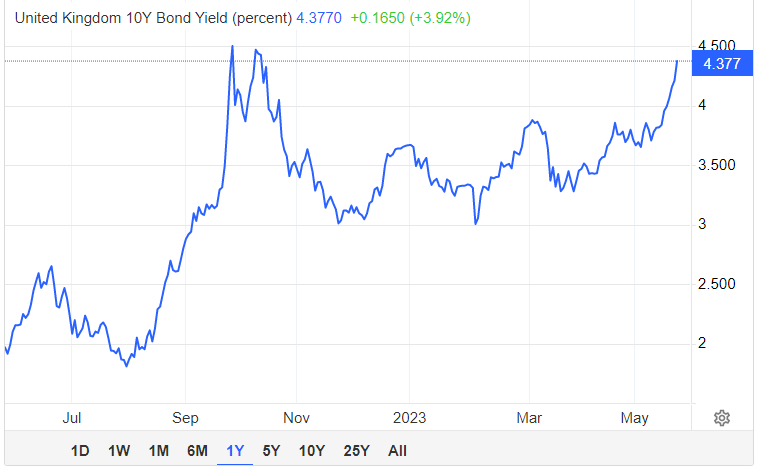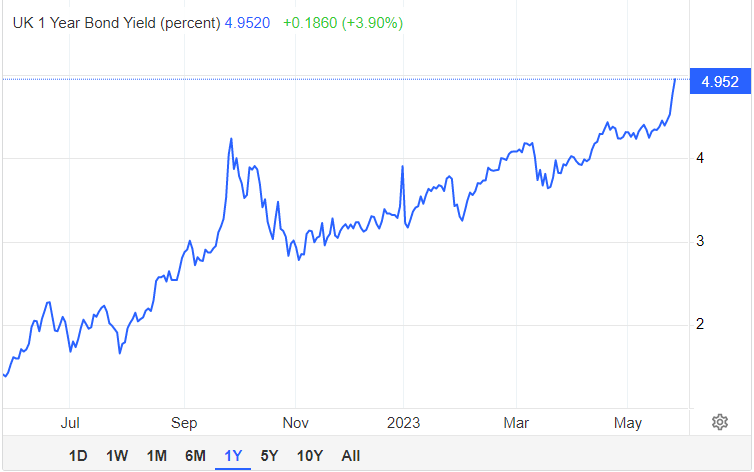Cast your mind back to last September. Liz Truss was the new British Prime Minister and Kwasi Kwarteng had been appointed as the new Chancellor. Together, they came up with their “pro-growth mini-budget” which contained a lot of tax cuts. However, the markets didn’t like this approach and swiftly removed them both from power. The most blatant coup in recent history, replacing Liz with the globalists’ man, Rishi Sunak.
Just before Liz was unceremoniously dethroned, the IMF decided it needed to step in. It told the UK that it did “not recommend large and untargeted fiscal packages at this juncture, as it is important that fiscal policy does not work at cross purposes to monetary policy”.
The UK duly obliged and Sunak brought in another globalist, Jeremy Hunt, as Chancellor. Lockdown loving Hunt took the IMF’s advice and in came high tax and slow growth policies.
At the time we were told that bond yields were spiking due to “Trussonomics”. MSM papers told us how expensive our mortgages had become due to Liz’s mini budget, completely failing to mention the excessive money printing that had occurred during the pandemic.
So with Hunt doing what the IMF asked, everything should be ok, shouldn’t it? Well apparently not. Something is spooking the markets.
The chart above shows UK 10 year bond yields. You can see the spike in September and how in recent days it has almost spiked to the same level again.
One year bond yields are spiking well over the level they did in September.
A reason for this spike is that this week, although inflation dropped to 8.7%, it was higher than market forecasts of 8.2%. Food price inflation was still at a massively high 19% and Core CPI rose by 6.8%. Apparently this sticky inflation was too difficult to predict in the City of London whilst anyone with an ounce of common sense could see inflation remaining high for a long time due to excessive money printing.
The yields on the various bonds indicate trouble ahead with curves indicative of uncertain economic futures. The markets are signalling increased risk and uncertainty as well as the likelihood that high inflation will persist.
US bonds paint a similar picture with the additional signal that the economy is about to slow down in the near future.
Commodity prices are also signalling a slow down with oil and gas significantly falling. This suggests that markets are predicting a decrease in demand due to slower global economic growth. However, even with these massively depressed prices, energy prices for consumers are still at near record highs.
It is clear that Liz Truss’ mini budget last year was not really the cause of the spike in bond yields. They happened then and are happening again due to stresses in the financial system and an increase in perceived risk. Liz was used as a scape goat to cover for the strain the financial system is under and to bring in a more suitable globalist Prime Minister.
Inflation will remain high for a while, interest rates will increase and households will feel increasingly more pain as their mortgages and rent increase. And the cherry on the top will be that government spending will need to be significantly cut, meaning the already shoddy services provided by them will only get worse.






Standard government response:
Trust the experts (IMF).
Sunak is 94% effective against inflation.
You should be glad to have received the Sunak.
The inflation is mild, short lived and the economy is expected to recover quickly due to Sunak.
It would have been so much worse had you remained with Truss.
The effectiveness of Sunak was always expected to wane over time.
We never said Sunak was effective against bond yield spike. In any case, the current spike is not the same as the previous spike. As you can see it’s changed over time. This current spike is milder.
Sunak remains safe and effective at preventing serious economic consequences.
Don’t even think of trying an alternative treatment like Labour, you’re not a horse.
Funny. I had been watching the 30 gilt yields for a while too. The last time they touched 5% Truss was rolled. Some pension funds were forced to sell 30 yr gilts until the BoE or someone else intervened to bring yields back down. It's looking very close to getting to the 5% again. Perhaps it will be Sunaks time to be rolled?